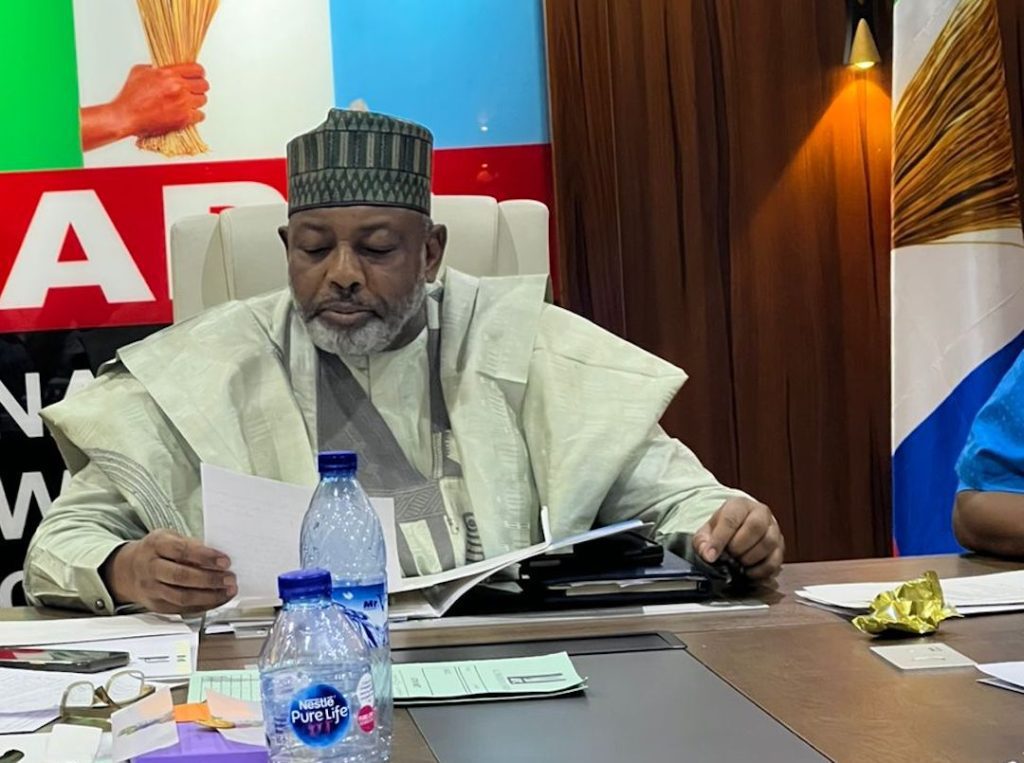The Minister of Agriculture and Food Security, Senator Abubakar Kyari and the Senior Special Assistant to the President on Sustainable Development Goals (SDGs), Adejoke Orelope-Adefulire, have revealed that food sufficiency is possible in Nigeria going by deliberate efforts being put in place to ensure that our people do not go hungry.
According to the agriculture minister, the availability of farming equipment is key in this regard. He said the production of 2,000 tractors in-country yearly would enhance food production, create jobs for Nigerian farmers, especially women and youth as well as available food and nutrition security in the country. Kyari stated this while receiving in audience a delegation from John Deere, led by its Vice President, Jason Braintley. The delegation, according to the Assistant Director, Information of the Ministry, Ezeaja Ikemefuna, was on a courtesy visit to the minister in Abuja, which included the chairman and directors of Flour Mills Nigeria as well as the Country Director of Tata Africa Services. Kyari noted that the visit was a follow-up to the meeting between Nigeria’s Vice President, Kashim Shettima and top officials of John Deere at the recent World Food Prize Foundation held in lowa, United States. He said when produced, the government would not off-take the tractors but provide the enabling environment to make the tractors affordable at low-interest rate to Nigerian farmers and boost all-year round farming.
Kyari pointed out there was a need for farmers to form clusters or co-operatives to ensure that they have access to mechanisation and pay instalmentally within a few years. On his part, the Minister of State, Agriculture and Food Security, Senator Aliyu Abudullahi, stressed the need to evaluate existing co-operatives and ascertain those that require support to enable them access the tractors when available, just as he also emphasised the importance of identifying crops most suitable for mechanisation. The Vice President of John Deere, Braintley said that the company was exploring the feasibility of hiring, acquisition and production, in addition to after-sales services, supply of genuine spare parts and training of operators and mechanics.
In a similar vein, the Senior Special Assistant to the President on Sustainable Development Goals (SDGs), Adejoke Orelope-Adefulire has identified climate-smart agricultural practices as the way forward to achieving food security and sufficiency in the country. Orelope-Adefulire stated this while delivering a keynote address at the maiden conference of the School of Agriculture, Food and Natural Resources, Olusegun Agagu University of Science and Technology (OAUSTECH), Okitipupa, Ondo State. The theme of the conference was “Sustainable Climate-Smart Agriculture In The Wake of Food Insecurity and Migration”. Represented by Dr. Ifeanyiwa Nnamchi-Nwangu, her Personal Assistant, Orelope-Adefulire emphasised that Climate-Smart Agricultural (CSA) practices would help Nigeria increase agricultural yields, productivity and incomes.
She also stated that CSA practices would assist in adapting and building resilience to climate change and reducing greenhouse gas emissions that are very hazardous to human, plant and animal survivability. Orelope-
According to her, the approach would substantially reduce bribery and corruption, and ensure effective collaborations among government, private sector, academia and industry to leverage policy, research and innovations to tackle critical issues. “In doing so, we will not only achieve food security in tandem with the SDGs, but also build a prosperous and resilient nation. The Nigerian government is actively making efforts to address climate change impact through initiatives such as the Great Green Wall projects that are not only helping to restore degraded land but also contributing to biodiversity conservation and climate adaptation,” she said. Orelope-Adefulire said the Federal Government had put in place intervention programmes to address the challenges of food security in the country.
The SSA to the President further highlighted the intervention programmes to include release of grains and fertilizers to farmers, creation of commodity board, engagement of security architecture for the protection of farmers. She also said directive has been given to the Central Bank of Nigeria (CBN) to fund agricultural value chains, increase revenue for food and agricultural exports, trade facilitation and creation of synergy between the Ministry of Agriculture and Food Security, and Water Resources to ensure irrigation of farmlands. She, however, disclosed that her office was ready to support and partner with OAUSTECH for its commitment to “advancing knowledge in the crucial area of food security in the country”. At the occasion, the Vice-Chancellor of OAUSTECH, Prof. Temi Ologunorisa thanked the speaker for delivering the keynote address.

